-
Archives
- November 2017
- November 2016
- October 2016
- April 2016
- March 2016
- November 2015
- February 2015
- July 2014
- June 2014
- October 2013
- January 2013
- October 2012
- July 2012
- April 2012
- March 2012
- February 2012
- January 2012
- December 2011
- November 2011
- October 2011
- September 2011
- August 2011
- July 2011
- March 2011
- February 2011
- January 2011
- November 2010
- September 2010
- April 2010
- March 2010
- February 2010
- March 2009
- February 2009
- March 2008
- February 2008
- November 2006
- August 2006
- March 2006
- August 2005
- July 2005
-
Meta
Daily Archives: November 23, 2017
Rajasthan… Reveries
Is it possible to inhale…
…….and exhale at the same time?
If a place can be a question then the above one would be Rajasthan, a land full of opposites, often seeming blithely ignorant of its own contradictions.
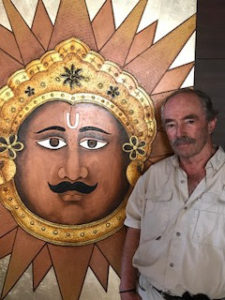
Hugging tradition while courting development. Cities choking on plastic and fumes connecting to hamlets where peacocks and chinkara gazelle wander through clean sandy courtyards. Strangling in a web cinched ever-tighter by motorbikes and cell phones within a vast, tranquil emptiness.
What follows are a series of postcards of the deep impressions of my time here.
Desuri, Marwari, Jodha Stables
As the sun subsides to the horizon, a yellow sigh in a silver soft sky, five women pick cotton. Pink, magenta, lavender, emerald, flame, ruby, their saris burble through the dense green foliage. Lime green parrots flit among the heavy-limbed banyans, shrieking, fluttering, alighting only to take off.
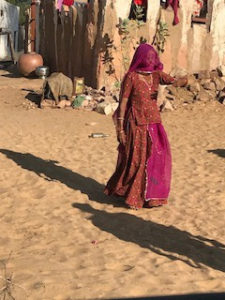
Lithe village dogs, tan and taut-limbed, leap from slumber so deep not even the wheels of a motorbike at their toes disturbs them. That is till now, when we, 3 riders on fine Marwari horses, accompanied by a Rottweiler and a Doberman, walk thru their village.
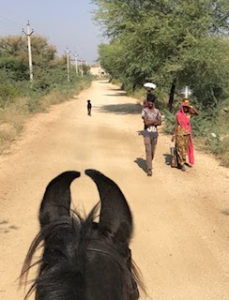
Howling in outrage they bristle and bare teeth. They mock charge with false bravado, skidding to a halt in puffs of dust, making sure they are well out of range of a horse hoof.
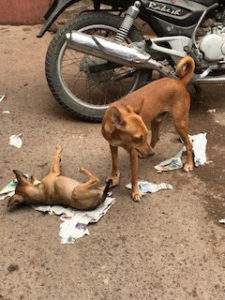
Lest you feel sorry for these dogs, feeding them is a virtuous act; I see old women and working men leaving offerings for their favorite dog(s) everywhere.
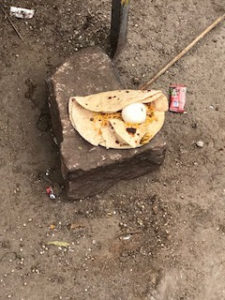
A peacock struts a brown field already dotted by the winter’s crop: tender green shoots of cumin. While others in the family till the soil, a man sits quietly at the edge of a field of green cane stalks, legs crossed in the lotus position, a bulging white turban shading his thin dark face. He turns to watch us, revealing a flamboyant bristle of white mustache.
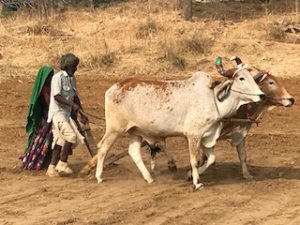
One hand holds a walking stick. The other raises in slow salute. A bare warm breeze carries with it a baby’s cry from behind a stone wall, along with some half sweet half herbal smoke from the family’s cook fire.
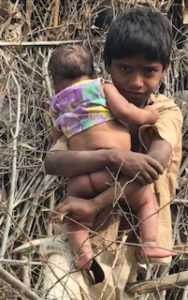
Jodhpur’s Sardar market
15:00 on a hazy mid-November Saturday and the plaza circling Jodphur’s clock tower is humming like a beehive in overdrive. It’s the day of the new moon, a holiday for which all factories are shut, and now those 1000s of workers on one-day holiday have come into town for some shopping. I’m at the hub of Sardar Market where today everyone’s dressed in their best, second, third or fourth hand though it is, as betrayed by the ragged edges and frayed hems on shawls and shirts, edges so frail they no longer can hold a mending stitch.
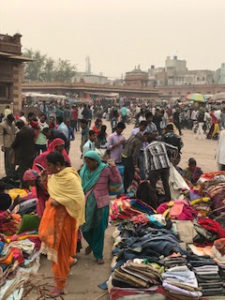
Couples and small families, thin, dark skinned, with sharp features and serious gaze, wander among tables groaning under bins loaded with plastic sandals and Chinese sneaker knock-offs, past wood push carts densely fringed with men’s belts, along tables groaning under pyramids of gaily colored bangles. But the true focus seems to be what’s in front of me: the used sari vendors. This 30’x50’ street plot holds 20 female vendors planted like shrubs among the fat bundles and piles of bright cloth, their kids playing along the perimeter and a handful of toddlers flung onto the soft warm piles of clothing, asleep in the sun.
Our walk through some of Jodhpur’s blue neighbourhoods has brought us to the square.
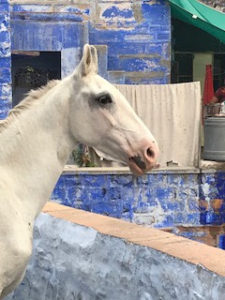
And from that ramble I can parse the smell in the warm air into the light smoke from the home small fires burning the night’s refuse, the sweet rot from squashed vegetables mixed with manure, and petrol fumes from the hellish tangle of motorbikes and auto rickshaws clamoring through the plaza dodging shoppers and gawkers like a matador avoiding a bull’s horns. And with just as deadly results for any miscalculation of speed, direction or intent.
There’s an air of pleasure and excitement mingled with purpose, as shoppers husband their hard earned savings and husbands eye wives eyeing a new sari. The women plunge up to their elbows into fabric heaps as bright, colorful and scintillating with sequins as a box of Christmas ornaments. They’re intent on a color or design or fabric known perhaps only when they see it, and they’re willing to sift patiently and shake their head politely until the right 9 meters of cloth appears. The 30 rupees they will part with for a used sari (50 cents) is hard earned and long saved.
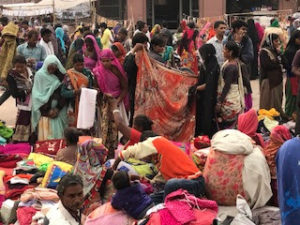
A girl of ten or eleven, scrawny, in baggy leggings and a frock two sizes too big, sports a new barrette, green and curlicued, in her dusty and sun bleached ponytail. The pleasure of her new adornment is obvious as she stands by her mother, fingering the ornament she cannot see. Her mother wears a heavy pink flannel car coat over her daffodil yellow sari, shyly holding a red sari a-sparkle with gold threads up to her chest for her husband’s input. The girl herself won’t wear a sari till she marries.
There’s a continuous cycle of unfurl, hold up, query and discard going on. Here a sari the color of a peacock’s tail, there an olive grove in summer, another like a box of saltwater taffy, or a raspberry crumble. A husband in a pink shirt, his head wrapped in a green and grey cloth holds a nubbly midnight blue sweater to his chest for his wife’s approval. Next to him an older man grimaces, red-tinged tufts of white hair spiking from under the dun scarf tied around his head, his sharp shoulders wrapped in a once handsome olive shawl shot through with yellow and black diamonds. It’s tattered, a large tear in the back, some edges more than frayed. He holds a shopping sack laden with purchases while his wife, dressed in dayglow pink sari embroidered with silver daisies, lifts options for consideration.
The vendors need sustenance but no one has time to leave their heaps. So the chai walla weaves through the crowd with a thermos and stack of tiny paper cups, flirting with a smile or head waggle as he pours.
Voices rise and fall like the cry of seagulls when a fishing boat comes into harbor. Motorbike horns cheap and caw in vain for attention from pedestrians preoccupied with more urgent business than stepping out of the way. And then a hand disappears into the top of a sari blouse, as if to scratch an itch. But it comes out holding a thin wad of folded bills from which one or two are peeled off and dropped casually on the nearest pile. A deal has been struck.
Hacra
We stayed with a family in Hacra Dhani, a farming community in the semi-desert near Osiyan. The days there were sun-filled, the cold nights blazing with stars. Whether by camel cart or on foot, we ventured from home to home, moving at nothing faster than village pace.
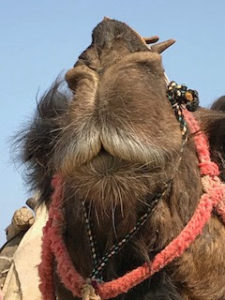
Everywhere we sipped chai, till even I had to refuse the last cup offered, so awash with milk and spices was I. I sat with the women of a Bishnoi family while Bernard regaled their men with stories.
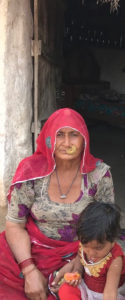
Millet and peanut harvests were already in their little storage huts, cotton ready to pluck, and castor beans ripening.
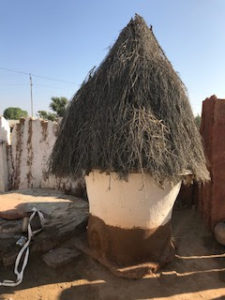
The farmers are doing well, as evidenced by the heaps of red granite blocks piled in front of each compound, ready to build big square houses to replace the large round mud&daub thatched huts of yore. We provide distraction for a family of camel herders moving rocks for their new home. They’re curious: Does America have a caste system?
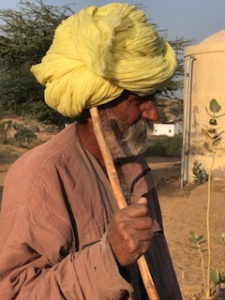
At the home of a weaver, 18 children crowd into the carpet weaving hut to observe us. The shy turn away and break into fits of laughter if we get closer. A few braver ones practice words of English and urge us to take their photo. Over and over. And over.
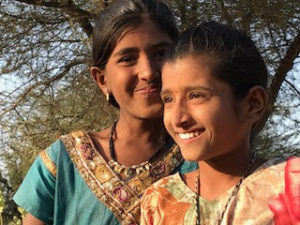
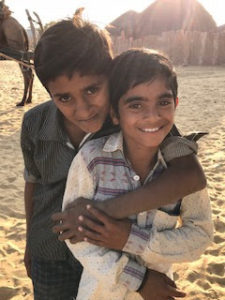
Jaisalmer
In the early morning hours we make our escape from the reeking, hellish congestion of Bikaner’s narrow old quarter, intent of getting out of town while the city’s 500,000 motorbike owners are still abed. We’re glad to be on the open road, passing the usual assortment of ungainly vehicles, waiting patiently with everyone else at the ever-present railroad crossings.
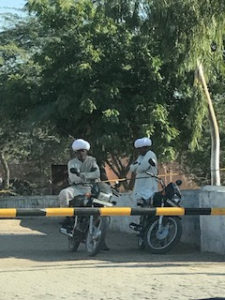
A guard wrapped against the morning chill stood at a factory entrance, his hand resting on the head of a three-legged pariah dog. Both stare vacantly into the distance, perhaps at the ceramics and brick factories whose smoke stacks pierce the horizon like porcupine quills, each streaming a long grey lag of smoky effluent. The drive is a bone rattler, the pavement so chewed up in places its as if cows during their lean months had taken bites out of it.
From Phalodi to Jaisalmer the desert grew more bleak with factories and the weedy acacia thorn trees. Camels were supplanted by more contemporary ships of the desert: camouflage caravans of heavy military trucks, lumbering nose to tail through the desecrated desert. Their fifth wheels are shiny with grease, ready to attach to trailers transporting … missiles? …tanks? into position somewhere, for something that portends no good. We zip past an Air Force base, with a gate over which the company logo is displayed in meter-high gold lettering: Strike Hard, Cut Deep
And finally we reach the beauty of Jaisalmer, a small blocky town which wakes reluctantly in its brown morning haze, hunkered below graceless yellow water towers. Above is the fabled fort, ten centuries old, its color a dreamlike blend of amber and butterscotch, clover honey, crème caramel and saffron. Walls undulate and ripple, a shimmering mirage of faded ages. It appears to rise and subside simultaneously, at once surmounting the crumbled slopes below and inexorably drowning in them.
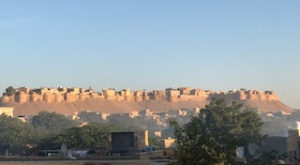
It’s a mirage, except those are the tandem fighter planes, like roaring quotation marks, on routine fly by of the India-Pakistan Border a mere 80 miles away.
It’s been a tremendous trip. Like this little rat at Deshnok Temple, I feel like I should go find someplace tranquil, uncrowded and not moving, for a long snooze.
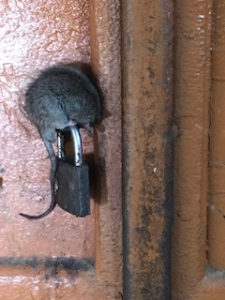
Okay, breathe out now. And to all those who are not presently in India eating curry, Happy Thanksgiving.
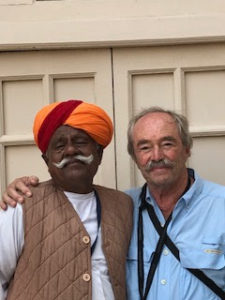
Posted in Dispatches, Gujarat and Rajasthan 2017
Leave a comment










